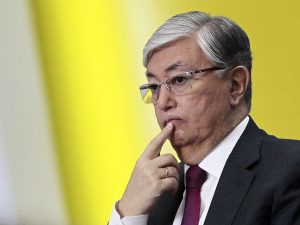Kazakhstan’s president took aim at the country’s business elites, those who stash their extraordinary wealth abroad.
“Enough of toying around, look at them, carried away with their games, keeping their money abroad, buying yachts and mansions in multiple countries… It is safer to keep money here, at home, we will ensure it is safe… If you fail to do this, I warn you in front of the whole Kazakhstan, I will use other ways to return that money to Kazakhstan, but you will not be here any more.”
Of course, that was Kazakhstan’s First President Nursultan Nazarbayev way back in 2017.
Current Kazakh President Kassym-Jomart Tokayev is presently singing a similar tune.
In a January 11 speech, Tokayev took aim at Kazakhstan’s elites, particularly those tied to Nazarbayev. “Thanks to the first president… a group of very profitable companies has appeared in the country, as has a group of people who are rich, even by international standards,” Tokayev said on January 11. He went on to say that it was time for them “to pay their dues to the people of Kazakhstan and help them on a systematic and regular basis.”
Tokayev has overseen the partial sidelining of Nazarbayev cronies and relatives in the wake of the January protests and violence, which he blamed on foreign-trained terrorists. Most analysts link the shocking violence that took place largely, though not exclusively, in Almaty, to elite competition instead. Tokayev’s efforts to address social and economic points of tension and push out Nazarbayev elites attest to that reading.
The resignations of the husbands of Nazarbayev’s three daughters — Dimash Dosanov (married to Aliya Nazarbayeva) from his post as chairman of KazTransOil; Kairat Sharipbayev (married to Dariga Nazarbayeva) from his post as chairman of QazaqGaz; and Timur Kulibayev (married to Dinara Nazarbayeva) from his post as chairman of the Atameken business lobby — are not coincidences. Nor is the arrest this week of Medet Qumarghaliev, the chairman of Operator ROP, a recycling outfit affiliated with Aliya and directly targeted in Tokayev’s January 11 speech; or the much earlier arrest of Karim Massimov, who until the day before his arrest on treason charges (which have not been fully explained yet), had been heading Kazakhstan’s National Security Committee (KNB).
To address the social and economic grievances that drove protesters to the streets, Tokayev announced, among other things, a fund — “For the People of Kazakhstan” — to “deal with resolving real problems…[in] health, education and social support.” As Joanna Lillis explained earlier this week in an article for Eurasianet, there are more questions than answers about the fund and how it will operate even as money is coming in from big businesses: $44 million of $67 million accrued so far.
The fund may serve a dual purpose: placating the population while draining the coffers of problematic elites. Dinara and Timur Kulibayev own a majority stake in Halyk Bank, which incidentally poured into the fund already.
“That money could help our economy… The state provided you with the conditions to make that money and you are hiding that money of Kazakhstan somewhere else? Enough is enough!” is what Nazarbayev said back in 2017 about funds stashed abroad by the country’s businesses. He went so far as to name and shame several companies, some of which were at least partially state-owned by Kazakhstan’s national wealth fund, Samruk-Kazyna, such as KazMunaiGas.
Incidentally, reforming Samruk-Kazyna is among Tokayev’s announced reforms, but privatization of the fund’s assets has been on Kazakhstan’s to-do list for years. (Here’s a Samruk-Kazyna statement from 2016 about the fund’s privatization plans; compare it to the recently announced privatization push).
In remarks last week, Tokayev appealed to businessmen to invest in the country — and contribute to the new fund, of course. “If you link your future with Kazakhstan, then you must reinvest your funds in our country. This is your social and political responsibility to Kazakhstan.” He urged them to dismiss the “we earn here, we spend there” mindset.
Of course, there is a debate to be had about whether ostensible efforts labeled as “reform” are sincere steps toward actual reform or convenient bluster to sweep people’s concerns to the side and get to the real business of power consolidation.
Back in 2017, there was no shortage of snarky retorts to Nazarbayev’s raving, which many viewed as hypocritical at best. The Panama Papers leak of 2016 featured an appearance by Nazarbayev’s grandson, Nurali Aliyev, for example, who reportedly worked through a series of shell companies to purchase a yacht in 2008, named the Nomad. More recent reports continue to highlight the extraordinary wealth held by the Nazarbayevs, much of it in luxury real estate around the world.
Tokayev, at least given current reporting, does not carry such familial baggage. But this history will cause many to be cautious in accepting at face-value what the Kazakhstani government offers as reforms but which can also be repurposed for elite gain. This is why sorting out how the new fund operates is so critical: If there’s a lack of transparency, who’s to say it won’t just give rise to a new cadre of elites?

































